Complete Mage

Why just publish Complete Arcane when you can publish another supplement with goodies for arcane spellcasters? If you know half a thing about D&D 3.5, you do know that WotC plainly
loves to fellate Wizards and provide them with all kinds of neat toys, and this book doesn't disappoint on this frontier - some of the very best prestige classes ever published for arcane spellcasters are found in it.
Abjurant Champion
We are already off to a strong start with one of
the definitive gish classes in all of D&D 3.5. For those of you playing at home, "gish" refers to a spellcaster who doesn't hide in the back, but focusses on getting into melee by buffing themselves and whacking things with a beatstick. With all the wizard-fellating WotC does, gishes often end up being better at hitting people with a big stick than any pure martial could ever hope to.
Entry can be a bit of a pain without losing caster levels due to the BAB +5 requirement, but the feat is trivially easy, and the need to be proficient in a single martial weapon can be easily solved by being an elf or through the Militia feat.
In return, you get 5/5 spellcasting, full BAB and a d10 hit die. If the PrC stopped there, it would already be gold for gishes and super-solid for any other spellcaster, but it just doesn't stop there
- you also get actual class features on top. Abjuration spells that improve AC get improved (greatly helpful for gishes who tend to be squishy), all abjuration spells (not only those who raise AC, all of them) get double duration, and you can eventually cast abjuration spells as swift actions without extra cost. Arcane Boost is a bit weaksauce (converting spell slots for a small bonus for a single round), but we'll take it while we are at it like those sportsball stickers you get with your groceries.
The real fun is Martial Arcanist:
From this point on, your caster level in a chosen arcane spellcasting class is equal to your base attack bonus (unless it would otherwise be higher).
This has lead to some fun arguments on D&D forums (and by "fun", we mean "autistic", "overtly nitpicking" and "super-anal"). Depending on how generously your DM reads this sentence, this could undo the penalties of Mage Slayer or other juicy feats who come with the drawback of reduced caster level. Even if you have the most downpressing fun-hating DM in the world who reads this sentence in the worst possible way, this class is still solid gold.
Rating:
Amazing
Eldritch Disciple
The Eldritch Disciple is one of those theurge-style prestige classes that advances two different classes at the same time, in this case Cleric and
Warlock. Cleric 3/Warlock 1 is the intended entry way, other than that the prereqs are trivial.
This class provides 9/10 Cleric advancement and 10/10 Warlock advancement, so if you take the minimum amount of Warlock levels required, by level 20 you end up with the abilities of an 18th level Cleric and an 11th level Warlock. If you use the secret ingredient of the
Practiced Spellcaster feat, you can push you Warlock's eldritch blast up to be the equivalent of a 15th level Warlock.
tl;dr: This is overall a downgrade on a Cleric other than having some at-will abilities, but for Warlocks, this greatly increases their flexibility and versatility.
The class features are a bit light - you gain extra uses for your turning attempts, and eventually you can add eldritch essences as riders for free to you damaging and debuffing spells. You'll be on this ride mostly for the dual progression, so you shouldn't mind too much.
Rating:
Decent
Eldritch Theurge
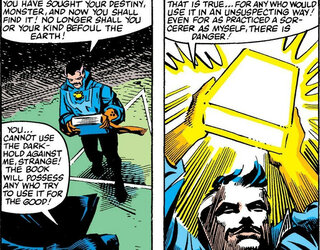
Another theurge-style PrC for warlocks, but this time in wizard/warlock flavour. You might think that the prerequisites of 2nd level arcane spells and 2d6 eldritch blasts force you to be a Wizard 3/Warlock 3 before you can enter, but there are easy early entry tricks. Practiced Spellcaster to boost your eldritch blasts beyond your actual warlock level has already been mentioned above. On the wizard side,
Precocious Apprentice gives you access to lvl2 spells before your time.
ET has great dual progression, 10/10 for both the wizard and warlock side. Assuming early entry tricks are allowed (which absolutely should be for theurge-style classes, they are already falling behind the curve enough) and you focus on the much stronger wizard side, you end up with the abilities of a 19th level wizard and an 11th level warlock (with eldritch blasts as if you were a 15th level warlock). This is only a mild inconvenience for wizards other than the opportunity costs of losing out on other PrCs, while the warlock side greatly benefits from the flexibility. See a common theme here?
The actual class features are once more unexciting, though. You get shoe-horned into the role of the blaster/debuffing mage, gaining the abilities to infuse your spells with eldritch essences, infuse your eldritch blasts with spells and deliver touch spells at range through your eldritch blasts.
Rating:
Decent
Enlightened Spirit
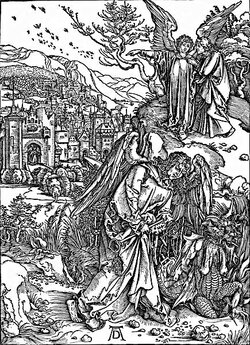
Enlightened Spirit is like an anti-Blackguard - where the Blackguard is a paladin who has fallen and now fully embraces evil, the Enlightened Spirit is a warlock who has been redeemed and now fully embraces good.
You keep advancing eldritch blast, but your forsake your invocation progression. Instead, you get some fixed celestial-flavoured invocations that are largely garbage.
There is niche use in epic games as Enlightened Spirit is a way to keep advancing some Warlock abilities past level 20, but if you play unironically play epic level games with a pure tier 4 class you are already more autistic than I want to deal with.
Rating:
Garbage
Holy Scourge
Holy Scourges are blaster mages who abhor evil and seek to eradicate it one fireball at a time.
The prereqs are largely trivial, although Knowledge (religion) 2 ranks - at a time you are supposed to know 3rd level spells - make me chuckle. The implication seems to be that you don't need to know a lot about religion to become a witch-burning fanatic, in fact, too much knowledge may distract you from your witch-burning mission.
The drawbacks are that you only gain 4/5 spellcasting advancement, and that you have to follow a code of conduct that requires you to autistically dedicate your life to drive all evil, crush it and then burn their lamenting women (who are likely witches anyway).
In turn, you get a meaningless +1 caster level boost to [good] spells (that gets more than negated by 4/5 spellcaster advancement), a meaningless damage bonus to your blasting spells, and the ability to add a smite effect to your attack spells 1-2x per day. This works like the Paladin ability, but derived from your Holy Scourge level, so as a capstone you get to add a whopping +5 damage to a single spell.
tl;dr: Even if you make heavy use of blasting spells (which you shouldn't in D&D 3.5), these are garbage features not worthy the loss of a caster level and the need to follow a code.
The only somewhat useful feature is Devoted Arcanist adding your HS level to your caster level for caster level checks to overcome spell resistance, but that isn't worthwhile enough to deal with this blazing dumpster of a prestige class - although I have to admit that a blazing dumpster is in-theme for a witch-burning class. Along with the low knowledge requirements this class might be some clever 4th wall breaking metacommentary rather than just bad design.
Rating:
Garbage
Lyric Thaumaturge
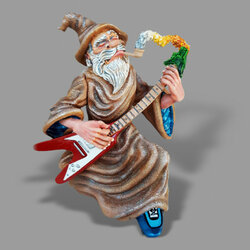
Here is a prestige class for the bards, and it is easy to enter for them. The only non-trivial requirement is the Melodic Casting feat, which is already neat to have anyway - it allows you to use Perform in place of Concentration for Concentration checks. Bards already want to maximize Perform, so this frees up a skill point each level to use for something different.
Lyric Thaumaturge grants 10/10 spellcasting advancement, and it makes you even more magical than a regular bard - you get more spell slots, and you also gain more spells known. Even better, the extra spells known come from the Wizard/Sorcerer list rather than the Bard list, so you can greatly improve your versatility and fill out gaps in your spell list.
The other class features are nothing to write at home about. Captivating Melody has use for social situations by allowing you to turn one of your many, many daily Bardic Music uses into a +2DC on enchantments and illusions. Sonic Might allows you to convert Bardic Music into extra sonic damage on certain spells - so it helps with something Bards should avoid even more than other spellcasters, blasting spells. Once more we'll just take it while we are at it, the spellcasting improvements more than make up for it.
Rating:
Good
Master Specialist

Yo dawg, I heard you liek specialist wizards, so I put specialist wizards into your specialist wizard. The biggest stumbling block for entry is that you must be a specialist wizard, which hampers versatility. If you already went down this route, this PrC is a good choice to prestige out of Wizard, though.
You gain 10/10 spellcasting advancement, some minor bits like free spells known, and some actual class features in the form of School Esoterica, free extra effects that are either always on or triggered by casting spells of your specialization school.
Rating:
Decent
Nightmare Spinner
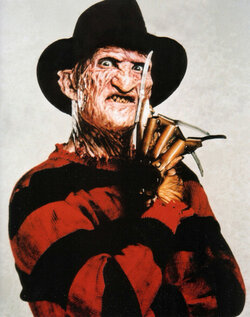
Nightmare Spinner is a 4/5 spellcasting-advancing PrC focussed on fear and mind-affecting illusion spells. That is also where the trouble of this PrC lies - it is incredibly easy to shield yourself from fear and mind-affecting effects, and the share of outright immune monsters keeps growing the higher the CR goes. Within its niche, the abilities of Nightmare Spinner are respectable when they work (especially Spirit Chill is neat when you like to stack fear effects), but they become less and less applicable as you grow in level.
One neat feature that gets commonly overlooked is Bonus Spells - a single level of NS is enough to add another spellslot for every spell level you can cast. This spell slot is limited to illusion spells, but you can still use it to fuel abilities like Arcane Strike or Divine Companion, or cast them through a staff to convert them into a different spell.
Rating:
Playable
Ultimate Magus
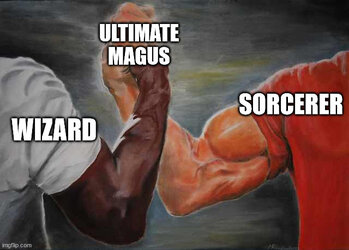
Another theurge-style PrC, this time intended for mixing a prepared arcane spellcaster with a spontaneous arcane spellcaster. In core, this usually means Wizard+Sorcerer, but the possibilities don't end there. You could go with one of the variant prepared spellcasters like Wu Jen or Sha'ir, or become a specialist wizard and then recover the banned schools through a fitting fixed list caster - say, ban Evocation, then combine with Warmage to gain access to the blasting spells anyway.
As usual for theurge-style classes, this a slight downgrade for the stronger half (usually the prepared side), but greatly improves versatility for the weaker half (usually the spontaneous side).
(And yes, the image could have been used for any theurge-style PrC, but I came up completely blank with fitting images, so I went with the most bland solution I could come up with.)
Rating:
Decent
Unseen Seer

The Unseen Seer is a sort of Wizard/Rogue multiclass. Unlike the Cleric/Rogue mish-mash of Shadowspy in the last installment, US is actually good at its job - it is 10/10 spellcasting advancing, it has decent skills, it keeps advancing sneak attack, it gives free Silent Spell to stealthily use your magic, and it comes with some flavourful divination-themed features.
Rating:
Good
Wild Soul
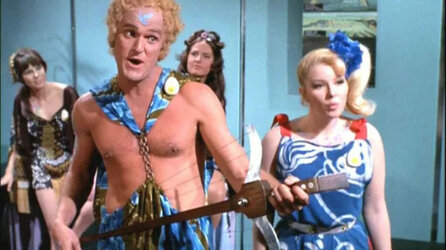
Wild Souls are nature-loving arcane spellcasters with a special affinity to fairies, so depending on alignment they swear allegiance to either the Seelie or Unseelie court and gain special features for it.
Entry is very easy, and 9/10 spellcasting is decent enough.
Main feature is that you add another spell known to every spell level you can cast. The list is fixed, but for spontaneous caster you'll take whatever can expand your tiny and/or restricted list of spells known.
Another need feature is that you add some fairies to your Summon Monster selection. Summon Monster is already pretty versatile, so a very good choice for spontaneous casters. Becoming even more versatile by increasing the selection makes it even better.
Rating:
Good
Tier List (Complete Mage)
Tippy Tier: N/A
Amazing Classes: Abjurant Champion
Good Classes: Lyric Thaumaturge, Unseen Seer, Wild Soul
Decent Classes: Eldritch Disciple, Eldritch Theurge, Master Specialist
Playable Classes: Nightmare Spinner
Garbage Classes: Enlightened Spirit, Holy Scourge
Truenamer Class: N/A
NPC Class (Fuck you Book): N/A









